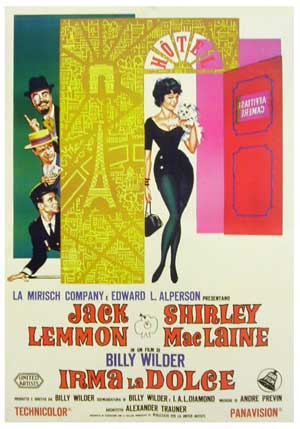
IRMA LA DOUCE
US, 1963, 147 minutes. Colour.
Jack Lemmon, Shirley Mac Laine, Lou Jacobi, Herschel Bernardi.
Directed by Billy Wilder.
Irma La Douce was a very popular comedy of the mid-60s, colourful in its presentation of the markets and red-light area of Paris and unusual in its sympathetic presentation of Irma, the prostitute with the heart of gold. The film is played for laughs, but it has its ironic and satirical touches and the whole film is presented as a yarn, "but that's another story". Shirley Mac Laine is at her liveliest in this role and Jack Lemmon is comic in his role of the disillusioned policeman turned pimp. His Ian Carmichael-type impersonation of an English lord is good. The original play was a musical. Here, the songs are not sung, but their melodies are incorporated into the film's score. This was a lighter film for director Billy Wilder who had directed the stars in the award-winning The Apartment (1960).
1. Was this just a comedy or was there some point behind the film? If so, what?
2. How seriously should the film be taken? Irma and Nestor are explored as characters in some detail, yet Moustache keeps telling us that 'that's another story' and this is where we are left at the end. How light is the touch of the whole film? How did the incidents of Irma collecting money from clients during the opening credits quickly build-up the atmosphere? How was the Paris environment, especially the markets at Les Halles, built up? How Parisian was the whole film? How did this environment colour the whole story and one's attitude towards it?
5. Did the film give a real picture of the city prostitute's life - why she is one, why she has protection, how she goes about her business, how she is exploited, how she has pride in her work and the support she gives her pimp?
6. Did the film give a real picture of the pimps, their easy life, their exploiting of their girls and their paying off of the police?
7. Did you like Irma? Why? Was she an attractive character?
8. How was the naive and zealous policeman satirised by Nestor's first day on the beat? What is the moral of this story about the honest cop - is it possible to be an honest cop or is this too cynical a question? Was Nestor's change of character convincingly done? When did he fall in love with Irma? Why did he fall in love with Irma? Did she fall in love with him or did she see him only as a better protector and she had prestige?
10. Why did Nestor invent the Lord? How did it show his love for her? How did Irma respond to the Lord? What did this reveal about her?
11. Did you feel sorry for Nestor as he worked all day really for love of Irma? Why? Why did he become obsessed with the Lord and jealous? Were you glad that Nestor went to prison? How did it help the cause of true love? Are you glad the film had a happy ending?
13. Do you think many audiences could find the film offensive - dealing with the prostitutes and pimps, satirising the police, the final marriage ceremony? Why?
14. Did you enjoy the light treatment of the whole situation? - Lolita etc., the Lord, the final search for Nestor, etc.?
15. Did you like Moustache? What role did he and his stories play?
16. The original stage play was a musical. Did Billy Wilder do well in using the music only for backgrounds and the dance scene in the bar or would it have been better to keep the songs?
17. Why did audiences like the film so much?